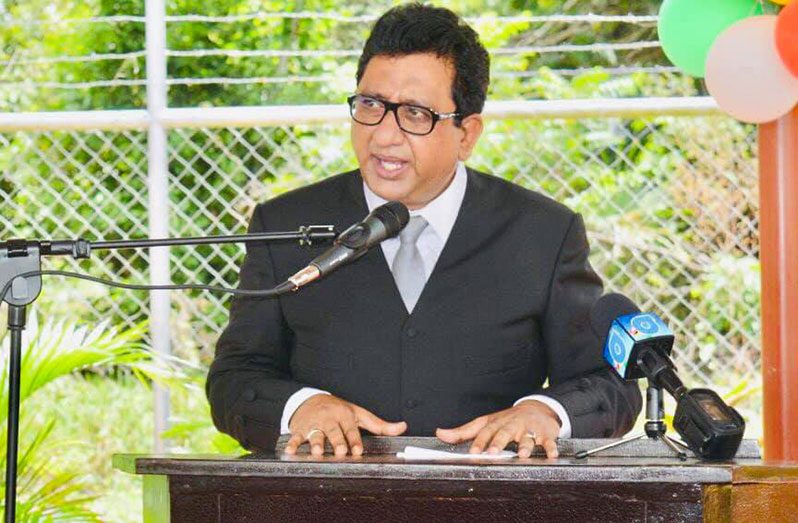– Reaffirms that GECOM constitutionally required to hire/dismiss staff
The Guyana Elections Commission (GECOM), established by the Constitution of Guyana, is mandated to hire and/or dismiss staff in executing its responsibility for the efficient functioning of the Secretariat of the Commission.
These were the sentiments shared by Attorney-General and Minister of Legal Affairs, Anil Nandlall, S.C., as he pronounced on the application filed by Chief Elections Officer (CEO) of GECOM, Keith Lowenfield, on Tuesday last, seeking an Order preventing two of the government-nominated GECOM Commissioners from participating in the discussion of the motion tabled for his immediate dismissal.
The People’s Progressive Party/Civic (PPP/C)-nominated GECOM Commissioners, Sase Gunraj and Bibi Shadick, had tabled a motion dated June 1, 2021, seeking the “immediate dismissal” of Lowenfield, in which they cited a gamut of reasons pertaining to breach of functions, duties, responsibilities and obligations.
In making his argument, Nandlall cited Article 161(A)(1) of the Constitution which states “the Elections Commission shall be responsible for the efficient functioning of the Secretariat of the Commission, which shall comprise the Officers and Employees of the Commission and for the appointment of all the staff to the offices thereof… and shall have the power to remove and to exercise disciplinary control over such staff.”
Lowenfield, in his application, has asked the High Court for a declaration that he is entitled to the protection of the rules of natural justice and the right to a fair hearing and determination of the motion; and a declaration that the government-nominated commissioners cannot properly participate, hear and determine their own complaint against him, amongst others.
Against this backdrop, Nandlall opined that the argument purported by Lowenfield lacks “logic and common sense” as “it inheres in both logic and common sense that in whom is vested the power to hire, concomitantly, enjoys the power to fire.”
The Attorney-General explicitly contended that “no rational mind” can dispute GECOM’s legal power and authority to dismiss any member of the Secretariat staff; he reasoned that “it must be elementary knowledge, even to lay men, that “disciplinary control” necessarily includes a power of dismissal.”
He outlined that like every other Commission that is an establishment of the Constitution, GECOM “shall not be subject to the direction or control of any other person or authority.”
“In the autonomous discharge of its powers and functional responsibilities, GECOM is empowered to make rules, to regulate the procedure of the Commission and until such rules are made, the Commission shall regulate its own procedure,” Nandlall wrote on his Facebook, on Saturday.
“This characteristic independence is guaranteed by Article 226 (2) of the Constitution in language expressed in such clarity that it brokers no ambiguity,” Nandlall said.
Article 226 (2) states that an “officer may be removed from office only for inability to discharge the functions of his offices, whether arising from infirmity of body or mind or any other cause whatsoever or for misbehaviour.”
Nandlall highlighted that GECOM has never made any rules to regulate its procedure in the manner contemplated by the constitution and therefore the Commission remains free to regulate its own procedure.
In demonstrating the synergy of the law in relation to his argument, Nandlall noted that like every other Commission or entity, whose constituent members represent different and competing interests, decisions are made by votes and in this regard, GECOM is no different.
Nandlall said that anyone who has even a “mere fleeting familiarity” as regards to how the business of an entity, whose decisions are made by votes, functions, would know that the decision-making process is initiated by the proffering of a motion, which is normally seconded and then debated and, upon conclusion, a vote is taken, with the decision emanating therefrom being usually expressed in a resolution.
“It is a fact of public notoriety that in the exercise of its freedom to regulate its own procedure enshrined in Article 232 (4) (above), GECOM has resolved to use this universally utilized process in treating with the issue of the removal of three of its employees,” Nandlall said.
“In this procedural matrix, the contention that the movers and supporters of these motions cannot participate in the debate or vote on these motions borders on such absurdity reminiscent of the proposition that 33 is not a majority of 65,” he added.
Further, Nandlall has expressed that “to invoke the sacrosanct jurisprudential concept of ‘natural justice’ into such a procedural prototype is simply to denigrate these hallowed principles.”












